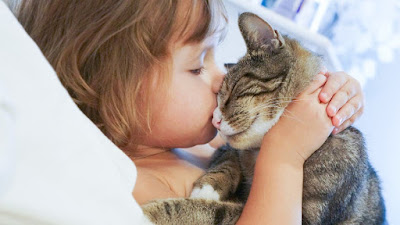The new report says cats may be the favorite pets for children with autism because they do not make eye contact like dogs.
And according to what was published by the British "Daily Mail", scientists in France studied children with autism during their interaction with their pets and found that dogs show more stable gazes, while cats did an equal ratio between gazes and stare.
A topic that interests you? In the crowd of vaccines competing for the title "savior of mankind" from the emerging coronavirus, the CEO of "Pfizer" announced ... in a shock load ... a vaccine before the end of the year that America may put up in a shock load ... The year America may raise health
The researchers also found that children with autism pay more attention to cats than dogs because ...constant eye contact can be stressful for someone who is not adept at interpreting interactive signals.
The hormone of love and trust
While many dog owners show an increase in the hormone oxytocin, which is secreted in situations of love, confidence, and calm, as a result of their dogs' long stares, such behavior can increase stress and anxiety in someone who is not adept at reading signs.
A team of scientists in western France surveyed 42 children between the ages of 6 and 12, 19 of whom had autism spectrum disorder, and 23 of whom had autism spectrum disorders. Family pets were used.
The researchers noted that cats exhibit fewer continuous gazes (staring) at children than dogs and that exchanges between children and their cats were rare.
Opportunistic and solitary cats
In addition, psychologist Marine Grand George, and a researcher at the University of Rennes who led the research experiment, explained that dogs, as cooperative social animals, resort to constantly using gaze as an attempt to bond and dominate.
Less 'invasive' looks
Grand George said that "since humans rely a lot on visual communication in their social gatherings, where direct gaze plays a major role from early on, there may be a particular sensitivity to the staring behavior that dogs follow, explaining that people with autism spectrum disorder may feel," With a less common pattern of interaction, more comfortable with short, less "invasive" cat gazes.
And according to Autism Parenting, for babies, cats are a low-key thing to focus on, easing the path to social interaction with people. Interacting with a cat can instill confidence, teach empathy and compassion, and reduce anxiety in autistic children.
